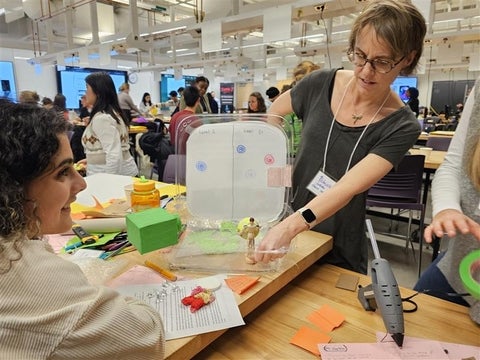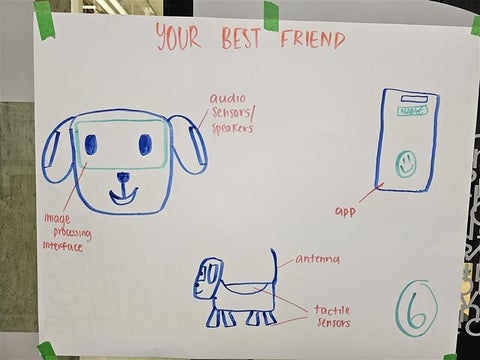The University of Waterloo hosted a workshop for a mix of undergraduate and graduate students from the faculties of Health and Engineering to help advance their transdisciplinary design skills development.
Called iSPARK - Innovation in Sensorimotor Skills Evaluation for Child Development: Making use of Adaptive Technologies, the one-day event provided 49 students from the University of Toronto, McMaster University, Wilfrid Laurier University and Waterloo with opportunities to work on projects in collaboration with peers from different disciplines to challenge and strengthen their approaches to problem-solving.
Ten teams of four to five students were formed based on their program of study to ensure an even mix of disciplines per group. Each team was given a different case study that involved a fictional child living with a sensory-motor disorder and asked to develop a solution. Participants were prompted to empathize with the profiled child, develop concepts, fabricate low-fidelity prototypes and share their solutions with the room.
Projects ranged from a digital best friend designed as a pet to help children experiencing social isolation feel less lonely, to a creative arts project to assist children with coordination disorders and a basketball themed tool to facilitate group play for children with autism spectrum disorders who can find social interactions challenging.
“Gathering information from fields other than your own is very important,” said Erica Rossi, a Waterloo master’s student in mechanical and mechatronics engineering. “As an engineer, working with health clinicians showed me why thinking with empathy in the design process is so crucial — we need to understand our clients’ realities as best as we can and pay attention to their intersecting thoughts and feelings to develop good problem statements and relevant solutions.”
To ensure the workshop aligned with real-world expectations, industry professionals from companies Adhawk Microsystems, Fretz Neuro Vision, AAVAA, Theia Markerless and Myant, along with early childhood educators and occupational therapists from KidsAbility Centre for Child Development, attended the event and shared their technical and clinical expertise with the student teams, guiding their projects with questions and suggestions.
“It was a very meaningful workshop, bringing together individuals from diverse backgrounds to address challenges through a human-centered approach to innovation," said Waterloo Engineering alum Merwa Al-Rasheed who now works as a biomedical engineer for Myant Inc. "It fostered an environment of interdisciplinary exploration, leading to solutions driven by empathy. This experience was truly inspiring and reaffirmed the crucial role of industry and academic partnerships in developing impactful and tangible real-world solutions.”

The iSPARK workshop challenges students from Engineering and Health to solve problems together.

iSPARK participants workshopped a number of projects using their skills as Engineering and Health students.
The workshop was hosted in the Pearl Sullivan Engineering IDEAs Clinic by Waterloo faculty members Dr. James Tung, a professor in Waterloo's Department of Systems Design Engineering, and Dr. Ewa Niechwiej-Szwedo, a professor in the Department of Kinesiology and Health Sciences, with colleagues Dr. Lori Ann Vallis, a professor in the Department of Human Health and Nutritional Sciences at the University of Guelph, and Dr. Nadja Schott, a professor in the Institute of Sports Science and Kinesiology at the University of Stuttgart.
“The workshop was very successful and lots of fun,” said Tung, “I was impressed to see how the students worked together to address clinically developed profiles of children with complex health needs. Each team merged their disciplines to collaborate seamlessly, using empathy and technical skill for truly effective problem-solving. We plan to grow upon the workshop's success and continue to foster important transdisciplinary conversations in the future.”
Get in touch with Chris Rennick, the engineering educational developer at the Pearl Sullivan Engineering IDEAs Clinic at the University of Waterloo, to find out how you can support and participate in upcoming interdisciplinary workshops designed to improve educational outcomes.